The Family Abuse Prevention and Resources Improvement Act of 2021 (H.R. 2119) seeks to improve and extend resources for survivors of domestic, family, and dating abuse. Key elements of the bill include:
Increased Funding and Resources:
-
- Funding for Services: Increases funding for programs that provide emergency shelter, crisis counseling, and supportive services for victims of family violence.
- Grant Programs: Expands grant programs to support state and local efforts in preventing and responding to family violence.
- Enhanced Support Services:
- Culturally Specific Programs: Provides additional support for culturally specific services to address the unique needs of diverse communities.
- Training and Technical Assistance: Funds training and technical assistance for service providers to improve the quality and effectiveness of their responses to family violence.
- Data Collection and Research:
- Improved Data Collection: Enhances data collection and research efforts to better understand the prevalence and impact of family violence and to develop effective prevention and intervention strategies.
- Prevention Efforts:
- Educational Programs: Supports educational programs aimed at preventing family violence through public awareness campaigns and community-based initiatives.
- Collaboration and Coordination: Encourages collaboration between federal, state, and local agencies to create a more coordinated response to family violence.
Impact of Voting Against the Bill
Voting against the Family Violence Prevention and Services Improvement Act of 2021, as Clay Higgins did, can be seen as highly detrimental for several reasons:
- Support for Victims:
- Reduced Access to Services: By opposing the bill, Higgins effectively votes against increasing funding for essential services such as emergency shelters, crisis counseling, and support programs for victims of family violence. This can lead to insufficient resources and support for individuals in crisis.
- Impact on Diverse Communities: The bill provides targeted support for culturally specific programs that address the needs of diverse communities. Voting against it undermines efforts to ensure that all victims, regardless of their background, receive the help they need.
- Prevention and Education:
- Missed Opportunities for Prevention: The bill includes funding for educational programs and public awareness campaigns designed to prevent family violence. Opposing the bill means rejecting initiatives that could reduce the incidence of family violence through education and early intervention.
- Community Impact: Effective prevention programs can have a broad positive impact on communities by reducing the prevalence of violence and creating safer environments. Voting against the bill denies communities these benefits.
- Data and Research:
- Hindered Progress: Enhanced data collection and research are crucial for understanding and addressing family violence. By voting against the bill, Higgins limits the ability to gather accurate data and develop effective policies and programs to combat family violence.
- Comprehensive Response:
- Lack of Coordination: The bill encourages collaboration between different levels of government and various agencies to create a coordinated response to family violence. Opposing the bill weakens these efforts, potentially leading to fragmented and less effective responses.
Clay Higgins’ vote against the Family Violence Prevention and Services Improvement Act of 2021 represents a rejection of critical improvements to family violence support, prevention, and research. This decision may have far-reaching negative consequences for victims, service providers, and communities by limiting resources, lowering preventive measures, and impeding the development of effective solutions.
